Do a Google search for Alexis Arguello and you end up with articles and videos about Aaron Pryor. Do one for Aaron Pryor and you end up with all kinds of links and posts about Alexis Arguello. It may not be entirely fair to either man, but these two champions and Hall Of Famers are defined to a great extent by each other. Much like Magic Johnson and Larry Bird, or John McEnroe and Bjorn Borg, the legacies and identities of Arguello and Pryor are wound up with each other and the two titanic battles they gave us in the early 1980s. And because those two clashes were so consequential, not to mention furiously competitive and exciting, they dwarf in significance almost every other match on their records. The destinies of these two warriors can never be separated.
As shattering as it was for Arguello when Pryor turned back his historic bid to become the first man to win world titles in four weight divisions, the experience of losing a major fight was not new to “The Explosive Thin Man.” In fact, as a young pro, he had lost two of the first five matches of his career, and in 1974 he failed in his initial attempt to win a world title, dropping a decision to Ernesto Marcel. He more than made up for that setback when he stopped Hall of Fame champion Ruben Olivares later the same year, and so began his great run as one of the best boxers on the planet. But even as a champion, Arguello knew defeat, dropping a split decision to Vilomar Fernandez in a non-title match in 1978.
But the loss to Pryor in 1982 was far more devastating. It wasn’t so much that in Pryor he encountered his most relentless and formidable adversary and that he took more punishment than in any previous bout, but more the fact that this was, by a large margin, the biggest fight of Alexis Arguello’s career, one of the biggest of the 80’s, a decade of huge fights. It was about the fact that Arguello had been perfectly positioned to become a superstar, and that the thousands in Miami’s Orange Bowl that November night were there expressly to see Alexis win, to see a new king of the sports world crowned.
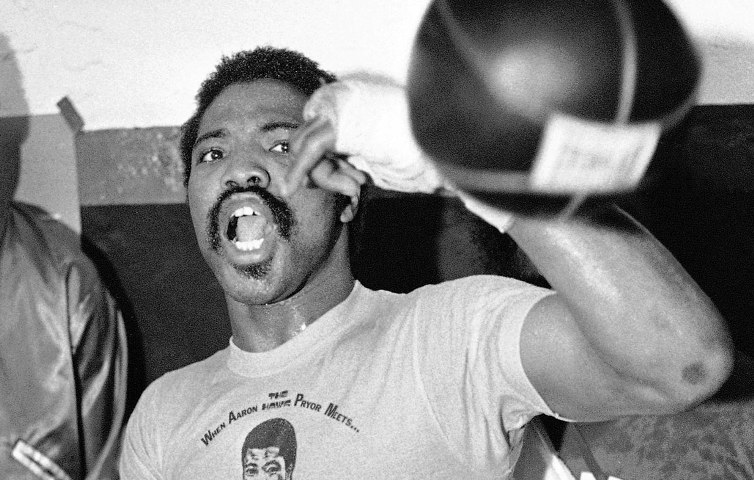
One of the reasons Arguello was poised to become a true crossover star, joining the likes of Sugar Ray Leonard, Roberto Duran and Marvin Hagler as mainstream attractions, was because of his reputation for class and sportsmanship. Previous to his showdown with Pryor, his most high-profile match had been his 1981 title defense against Ray Mancini, a bout watched by millions on live national television. Young “Boom Boom” Mancini’s quest to win a world championship for his father, a top contender in the 1940’s whose ring career was cut short when he joined the army during World War II, had captured the imagination of American sports fans. They cheered him on as he gave Arguello a tough and exciting battle before Ray succumbed to the more experienced champion in round fourteen. But in the post-fight interviews, the victor was nothing short of gallant, expressing admiration and respect for Ray and predicting Mancini would soon come back and win a world title, a forecast which came true short months later.
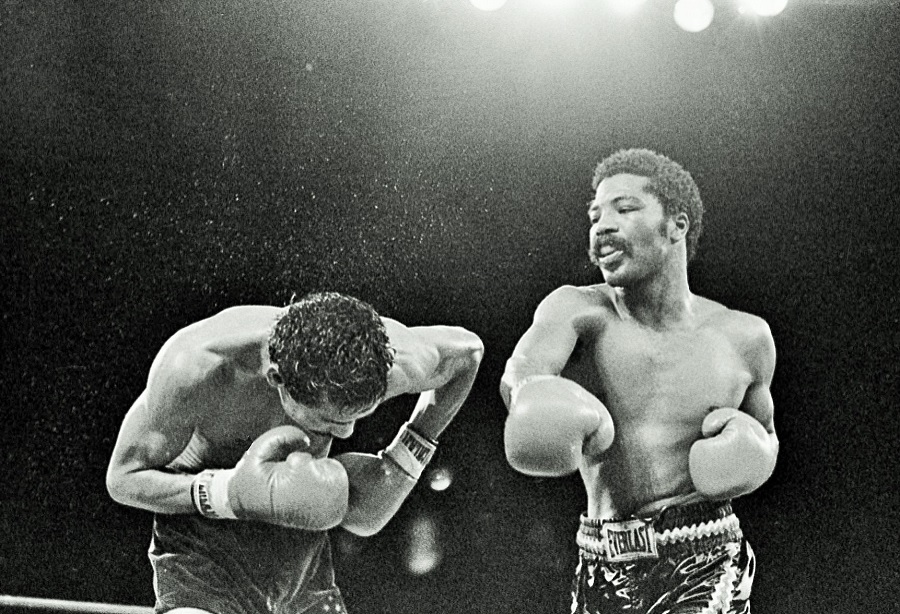
This display of sportsmanship made a huge impression and endeared Alexis to millions. And in the victories that followed, all broadcast on live television, sports fans could count on Arguello — now regarded as one of the finest pugilists in the world pound-for-pound, as well as an elder statesman and a latter-day great — to offer his fallen opponents similar classy gestures. But in the aftermath of the loss to Pryor, sports fans saw a different side of the triple-crown king.
It’s important to remember that most boxing experts thought Arguello too experienced and skilled for Pryor, and that his fans eagerly anticipated their hero establishing himself as nothing short of a sports legend with a monumental win. The pressure was immense and so was the disappointment when Alexis was pummeled into helplessness at the end of a sensational battle. Looking back, we know there was no shame at all in losing to the irrepressible force of nature that was a prime Aaron Pryor, but at the time many viewed “The Hawk” as not quite in Arguello’s league. And such was the Nicaraguan’s mortification at his defeat that, by his own admission, he feigned unconsciousness after the bout was stopped, frightening many as he lay unresponsive on the canvas for several long minutes.

And so the Alexis Arguello who emerged from the ring that night in Florida was a different man from the one who entered it. However, it was not defeat alone which left its mark on him, so much as defeat when millions of Latin Americans were fervently praying for his victory and betting large sums of money that he would redeem those prayers. Under the intense pressure, and with all the expectations and the ensuing disappointment, he cracked, and instead of modesty and class, Arguello showed the world bitterness and spite. Immediately following the loss he blamed his trainer, Eddie Futch, claiming the legendary coach had “overtrained” him and sapped his endurance. He would later apologize for the rash statement, calling it “the biggest mistake of his life,” but not before the venerable Futch vowed to never work with him again.
But no matter, there was in fact a better excuse to seize upon, that being the mysterious “mixed” water bottle which Pryor’s trainer, Panama Lewis, called for that night, just before the champion charged out and battered Arguello into submission. Those sympathetic to Alexis pointed to foul play by Lewis, especially after he was caught tampering with Luis Resto’s gloves the following June and was subsequently banned from boxing. Surely the real reason why Alexis Arguello, seemingly fated to make sports history in Miami, had fallen to a fighter most expected him to vanquish, was that Lewis, or someone, had undermined fair competition. Surely something explained the outcome other than the possibility that, while Arguello was a legend and a three division champion, Aaron Pryor had simply been the better man on the night.
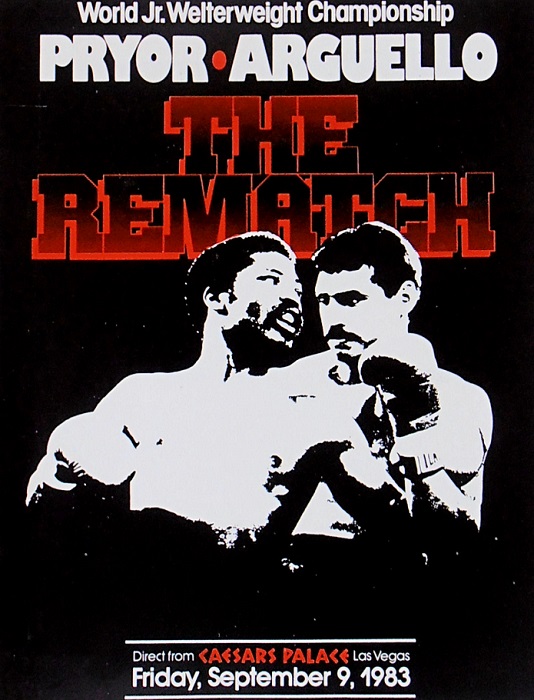
Thus, the need to redeem himself, and rectify what many viewed as an unjust outcome, became Arguello’s obsession. And one might have thought that, given the status of the boxers and the sheer excitement of that first savage encounter, a rematch would have been the simplest and easiest of things to arrange. And yet it was not. Pryor held the World Boxing Association version of the super-lightweight title, and the WBA, for reasons no one could fathom, refused now to rank Arguello in their top ten, which meant he was not eligible for another title match. The sheer absurdity of the situation did not deter the WBA from denying him a ranking for several months, during which time both Pryor and Alexis made ring appearances, in the process risking millions of dollars.
Pryor, obeying the WBA’s bidding, turned in a perfunctory defense of his title, beating a boxer the sanctioning body absurdly deemed better than Alexis Arguello, Sang Hyun Kim of Korea. The fight was a deplorable mismatch and ended in round three. Meanwhile, Arguello, driven as he was to redeem himself, even though no redemption was needed given a career already more than Hall of Fame worthy, elected to face his former conqueror, Vilomar Fernandez, just four months after the loss to Pryor. He won a unanimous decision, but when the WBA still denied him a ranking, he then fought former WBA champion Claude Noel, who succumbed to Alexis in three rounds. Arguello was in fact preparing to face rising contender Billy Costello when, finally, the geniuses at the WBA realized the error of their ways and granted him a top ten ranking. And just like that, the rematch was on.
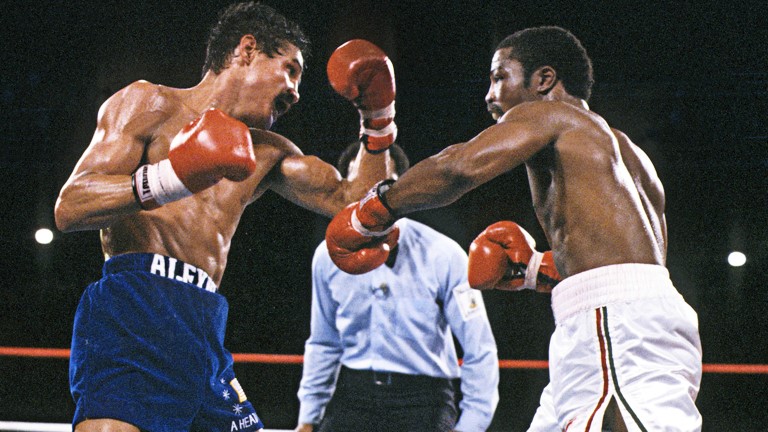
When Arguello vs Pryor II was officially announced, anticipation was just as high as for the first bout, but for different reasons. What spurred ticket sales in ’82 was adulation for Arguello and the expectation of history being made; this time it was the more straight-forward anticipation of straight-up excitement, of another action-packed war, that first scintillating clash regarded as one of the most exciting fights of recent years. But this time far fewer pundits were willing to bet the farm on Arguello seizing that fourth world title and thus the allure and magic of the initial Arguello vs Pryor battle was conspicuously absent. Instead of a massive football stadium filled to the rafters with delirious Latin Americans, the rematch was held at the more banal environs of Caesars Palace in Las Vegas.
Looking back, the more modest expectations, the delays and obstructions in allowing the rematch to happen: it was as if something was trying to save Alexis Arguello from a harsh reckoning with reality, with the painful truth that his failure to fulfill the expectations of so many had nothing to do with over-demanding trainers or mixed water bottles, but instead was about a driven champion in his prime who refused to lose.
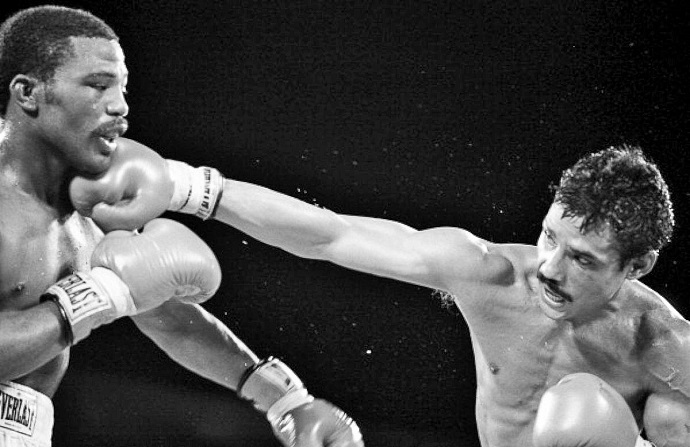
And indeed, Arguello’s fate was evident, to all but the most hopeful, early in the final act of this almost-Shakespearean drama of ambition and hubris. At the bell, Pryor vs Arguello II started in the same fashion as the first fight, with a thrilling, fast-paced, toe-to-toe slugfest in the opening round, both warriors showing no fear and letting go huge punches, both men landing. But just forty seconds in Pryor threw two jabs and then an overhand right which clipped Alexis on the chin; the challenger stumbled backwards and toppled to the floor. Right then and there the worst fears of the Arguello faithful appeared confirmed. But Alexis was not prepared to accept that Pryor’s speed, aggressiveness and punching power were more than he could handle. Instead he rose and battled back valiantly, shaking Pryor before the end of the round with heavy right hands of his own.
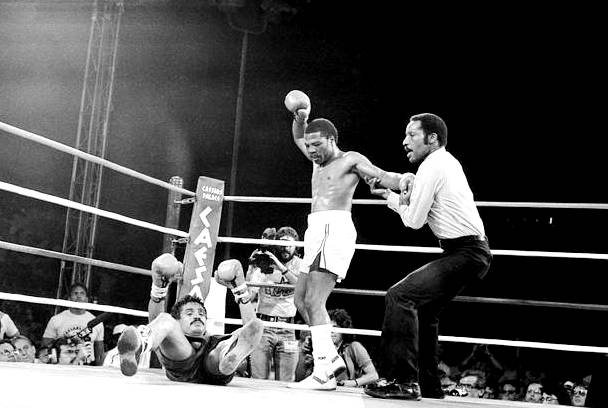
Alexis rebounded in the next two rounds and in fact he imposed his will in a way he never had in the first fight, throwing combinations of power punches and forcing Pryor to give ground. In the second a right hand buckled the champion’s legs, sending him stumbling across the ring near the end of Arguello’s best round yet against “The Hawk.” And in round
Source link





















